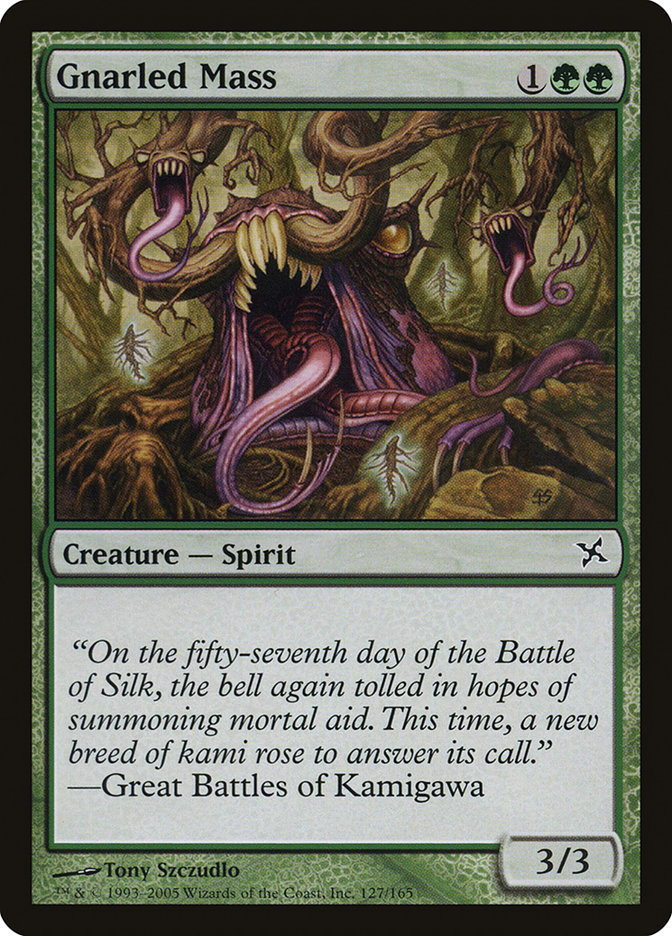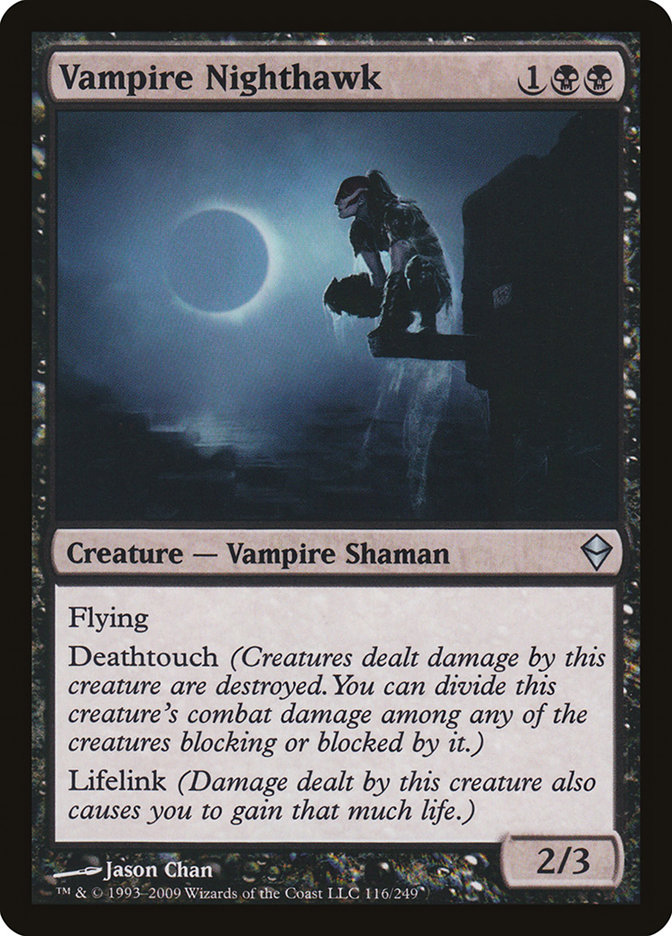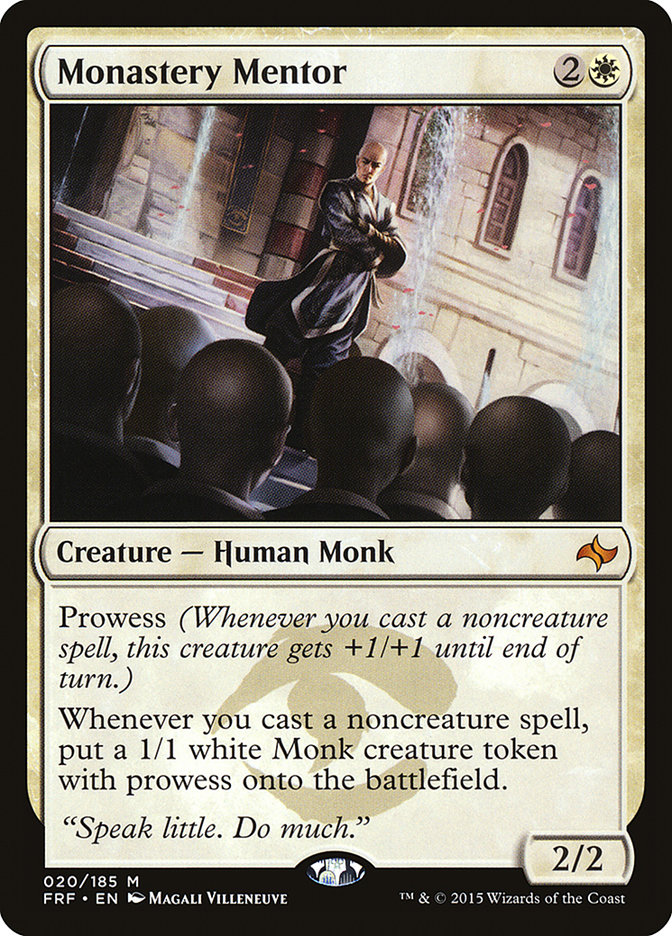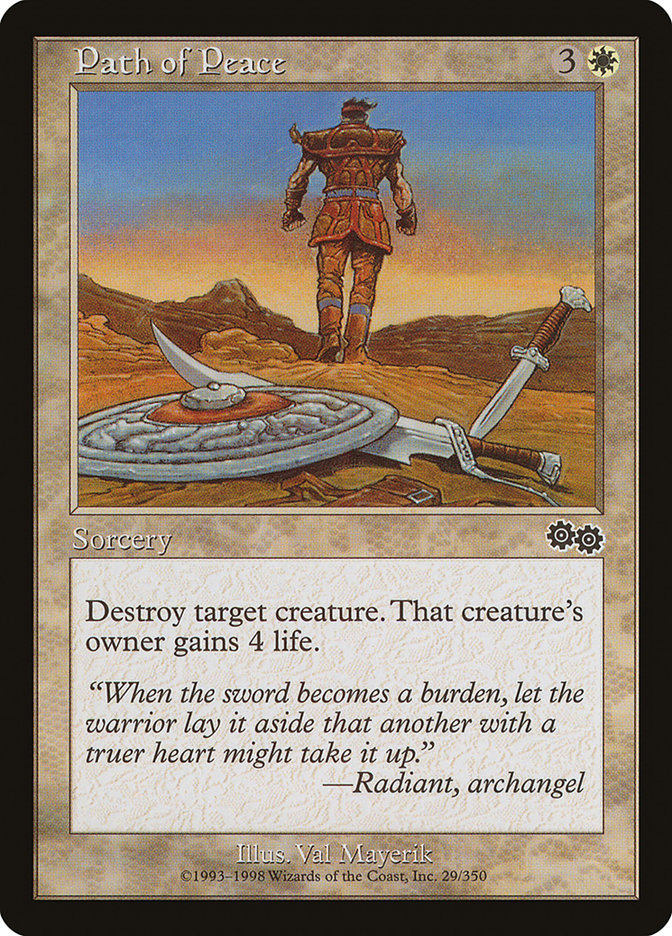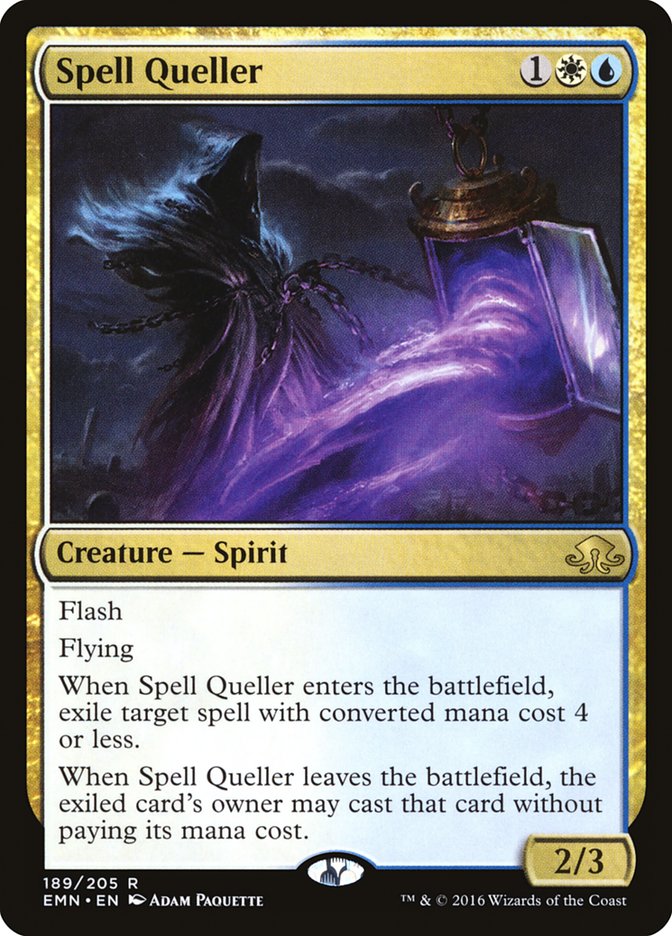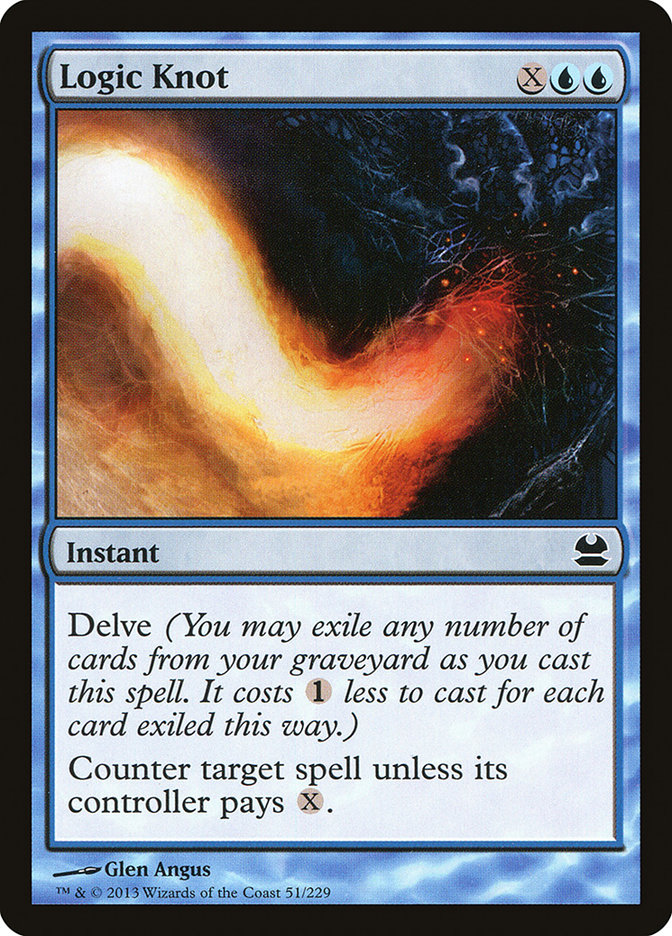Hello, and welcome to my last Magic article for the foreseeable future.
Yeah, I’m sad too. But it’s for a good reason: starting very soon, I will be living in lovely Seattle, Washington and working alongside the even more lovely people of Play Design, contributing to the making of this great game we all love. I’m excited and nervous and happy and scared and a hundred more emotions besides, all of which stem from the simple fact that my life is about to look very different from the form it has taken for the last several years.
So, this is my last article. There’s an expectation that last articles should be grandiose and important, that they should inspire and energize their audience. Often, this means getting personal. You explain how much writing has meant to you over the years, how much Magic means to you. You let the audience into your life and let them see past your façade into the heart of why you care.
I’ve read many of these capstone articles over the years and loved every one. They are a fantastic genre of article that is important and valuable, but they’re not for me. It’s not that I don’t feel these things, because of course I do. Days that pass by without me thinking about how lucky I am to live the life I live are few and far between. Still, we all have our strengths, and mine are not related to getting emotional in public.
That being said, I still want my last article to be special. So instead of getting emotional, I’m going to get meta. No, not meta like “metagame.” I’m not going to squander my last opportunity to write in this space on talking more Magic. You’ve all heard me talk about Magic plenty.
Today, we’re doing meta like writing about writing (about Magic strategy). Everything important I’ve learned in my years of doing this, laid bare for all to see. Everything I know that got me to where I am today.
Two disclaimers. First, these thoughts apply specifically to strategy writing. Other kinds of Magic content are awesome and useful, but I know next-to-nothing about them. Second, I’m not an English professor, so I’m not going to talk about grammar or sentence length or any other granular mechanic of writing. Those things are between you and your editor, but they are important and you shouldn’t neglect them.
Don’t Read the Card Text
This isn’t the most important thing I have to say, but it is the one I’m the most passionate about, and it is important.
Don’t. Read. Card. Text. To. Your. Audience.
This is nominally advice for Magic writing, but in reality, it’s just advice for Magic thinking. Card text isn’t an explanation or a reason. It’s not a justification or an incentive. It just is. Card text is a given, and using it for anything else is a waste of everyone’s time.
The words written on Magic cards are the building blocks of Magic strategy. Think of it like Legos: you’re not using the yellow six-dot block because the yellow six-dot block is inherently better than the other blocks, but because it fits with the blocks around it. A yellow six-dot block is nothing in and of itself; it’s only given meaning when you think about how a yellow six-dot block interacts with a red four-dot block or a blue eight-dot. Context is everything.
A three-mana 3/3 isn’t fundamentally a good or bad card. On its own, it’s not even a game piece. You can’t play a game of Magic with a single card. A three-mana 3/3 gains and loses game value based on how it interacts with the other game pieces available to players. In a world of three-mana 2/3s, the three-mana 3/3 is king. In a world of 3/4s, it’s nothing.
You would never say that you’re going to use a block “because it’s a yellow six-dot” and you should never say that you’re going to use a card “because it’s a three-mana 3/3.” Whenever you say things like that, you are shortcutting something interesting, something that is obvious to you but not obvious to the people reading your work. Is the three-mana 3/3 the most efficient card you can play at that spot on the curve? Does its body line up well in a popular matchup? Does three power represent a sizable and important threat in the format? These are the kinds of things you should be saying.
Your audience knows the card is a three-mana 3/3. They can read the words you’re writing, so they can read the card you’re talking about. Explain why the text on the card matters, not what the text is. Card text isn’t a reason; it’s a beginning.
Whenever I think about card texts as reasons, I remember a conversation I overheard when I was new to Magic, during original Zendikar. I heard someone ask his friend why he was playing Vampire Nighthawk, and the only answer he got was that “it has lifelink.” The conversation just ended there, and I was stunned. Of course it has lifelink. We all know it has lifelink. Why does it having lifelink matter? I can make assumptions about why having lifelink matters, but I won’t know what you think unless you tell me, and I’m reading what you wrote to find out what you think. I already knew that Vampire Nighthawk has lifelink. I didn’t need to read your work to find that out.
If you ever find yourself writing a sentence that is just reading card text to your audience, rewrite it. Dive deeper into why you think what you think and say that instead. If you can’t figure out why that card text is attractive to you on a deeper level than the text itself, you don’t understand your own Magic insights well enough to write about them. Shelve that idea, and come back to it when you have figured out why you think the way you do.
You’re Part of an Ecosystem (Don’t Reinvent the Wheel)
I truly believe that we are in the Golden Age of Magic content. Tons of people are trying their hand at being a content producer, and it is awesome. Spend a minute on Twitter, and you’ll see a link to someone’s new article. Spend five minutes, you’ll see two articles and a video. Spend an hour and you’ll see six articles, two videos, a blog post, and a Twitter thread so in-depth that it might as well have been an article. There’s an overwhelming amount of resources available to the people who want them, and that fact makes your job as a content provider much easier in some ways, and much harder in others.
In today’s world, there’s only one truly vital rule you need to follow in order to create content worth consuming: Be yourself.
Everyone has interesting thoughts about Magic and unique ways that they approach the game and specific situations in the game, no matter what level of player they are. You don’t have to be the best of the best to write strategy advice that others can learn from. You just have to know what you want to say, and say it well.
My approach is to have five or six specific, vaguely connected things in mind that I want to convey before I sit down to write. During the writing process, I expect that only two or three of these things will make it into the finished article. That’s fine. You always end up saying less than you think you will by the end of it, but it doesn’t matter as long as the things you said are worth saying.
However you approach writing, however you figure out what it is you want to say, the important thing to realize is this: your work doesn’t need to be self-complete. You don’t need to explain every aspect of the topic you’re touching. You don’t owe the topic comprehensive coverage. Focus on the unique and cool things you have to say, and gloss over the rest.
Let’s say you are very proficient with Deck X. The matchup with Deck Y is very intricate, and you have a lot of very specific things you do that other people don’t that contributes to you winning the matchup. You want to write about those things.
Those two things and the reasons behind them should be the bulk of your article. When you’re writing about very specific, intricate things, like in this example, it’s easy to get lost in the context. You want to talk about this very specific piece of strategy, but in order for your audience to understand why what you do is right, they first need to understand the deck and the general shape of the matchup and the specific subclass of game this scenario occurs in and…
Stop. If you carry down this path, the cool things you want to talk about are going to be an afterthought, not the focus of your article. In the old days, there was no avoiding this problem. If you wanted people to understand what you were saying, you had to give them the background. These days, the background you need to give them is out there already. Trust in your fellow content creators. Trust in your audience. They can gain the necessary background without you diluting your article talking about something you don’t want to talk about. Honestly, they probably already have the necessary background.
You do still have to provide context for what you’re talking about, but it doesn’t have to be in detail. As a general rule, no more than half of your article should be the context for what you want to talk about. Half is still a lot, but it’s a whole lot less than where you’d end up if you were determined to write A Brief History of This Specific Thing I Want to Talk About.
This ends up being all about pacing. You want to take your time where what you have to say is what you care about, and breeze through the parts that are just there to keep everyone on the same page. This is why it’s so very important to know before you start to write what it is you want to say. Take the time to smell the roses while you’re there, and be disciplined and keep your eyes on your feet through the rest.
Find a Way to Keep Going (Be Okay with Being Wrong)
Magic authors attrition out of the job for three main reasons. First, and least severe, sometimes life takes them other places. That’s what’s happening to me, and it’s the way you want to leave. Magic is important and awesome, but it’s not everything.
Second, lots of people just run out of things to say. This is normal and to be expected. When you start writing, you have access to everything you’ve ever learned and thought about Magic as potential topics. Turns out, it takes much longer to learn things about Magic than it does to write them out. No matter how granular you get and no matter how slowly you dole your knowledge out, if you write on a regular basis, eventually you will feel like you have exhausted everything you have to say about the game of Magic.
The last and most troubling reason has to do with the fact that writing about Magic strategy week-in and week-out makes Magic a huge part of your life. Magic is great, but the game has variance. Your thoughts on the game and you as a person are just as valuable when you’re losing as they are when you’re winning, but it never feels like that. Impostor syndrome is something nearly every Magic content creator I know struggles with, and it’s far from the only issue that Magic writing intensifies.
I quit writing in the summer of 2016 for a combination of those last two reasons. I had run out of things to write about, and I no longer felt that the mental struggle of publishing an article every week was worth it. It took months of encouragement and praise from Emma Handy to get me to pick up a keyboard again. I’m sure I would have quit again in short order if it weren’t for one simple insight I stumbled upon along the way: it’s okay to be wrong.
Nothing really ever made my impostor syndrome go away, but internalizing the fact that everyone writes things that are wrong sometimes and everyone struggles to find things worth writing helped make mine manageable. Accepting that being wrong is normal and to be expected is the best advice I have to offer on the third reason people stop writing, and it turns out that it also helps with running out of things to say.
When I returned to writing, I realized that I hadn’t run out of things to say. How could I? Magic is a constantly changing game, after all. There are always new things to think about, and thus, new things to say. What I had run out of was things to say that I was confident about. That’s quite the difference.
When you accept that you will be wrong sometimes in your published content no matter what you do, the range of topics you have interesting things to say about widens considerably, and it becomes realistic to never run out of ideas. Of course, this begs a new question: how can you ensure that your content is useful even when it’s wrong?
Figuring out the answer to that question is what I attribute my success as a Magic author. The secret is twofold: focus on the process, and compartmentalize the logic.
Think about the following Magic idea: “Bant Spirits is the deck to play this weekend.” This is the kind of idea that can be a centerpiece of an article, the thrust of what you are talking about. If you tell people to play Bant Spirits and Bant Spirits is good, you have been useful. Good job. The real test is finding a way to ensure that telling people that “Bant Spirits is good” is useful even when you’re wrong and Bant Spirits is the worst deck for the weekend.
The first thing to do is to focus on the process. Why you think something is more important than what you think. Your audience wants to know that you think Bant Spirits is good, but understanding what led you to that conclusion will be more useful for them long-term. Focusing on the process is a way to make your writing more timeless, even when it’s about a specific weekend or a specific deck.
Focusing on the process helps your audience learn something even when your conclusions are wrong, but it doesn’t protect them from your erroneous conclusions. No matter how great your approach to analyzing a metagame for a weekend is, it’s unlikely it will benefit someone enough to make up for them throwing away their weekend playing an awful deck. You need to give your audience the tools they need to disregard your conclusion when you are wrong, and to do that, you need to compartmentalize your logic.
When you assume something, tell your audience you assumed it. Be very clear with what conclusions that assumption is feeding. When you think Thing A causes Thing B, explain why in detail. If your audience knows you assumed Humans will be huge but disagrees, they won’t be eager to play Bant Spirits. If they know you think the Humans matchup is good for Tron which is in turn a great matchup for Spirits, but they think the Tron matchup is actually bad for Spirits, they won’t play the deck. Being clear about how you got to your conclusion protects your readers from your conclusion being wrong.
Compartmentalized logic looks like a long chain of “A causes B causes C causes D.” This chain is fragile: if you are wrong about any of your assumptions or causes, D won’t hold. Still, the assumption you made might be useful. Why A causes B might be useful. You can have a lot of good, useful info that will enrich someone’s Magic life and still be wrong about your conclusion. Be transparent about your thinking, and protect your audience.
Understand that none of this is an excuse to be lazy. Accepting being wrong doesn’t mean publishing things you know to be wrong. No matter how smart you are or how good at Magic, eventually everyone will be wrong in something they publish. You never know that you’re wrong until weeks later, but the articles you were wrong in aren’t blights on your record, as long as you ensured that they could still be useful.
Good luck in 2019, everyone. I’ll see you on the other side.


